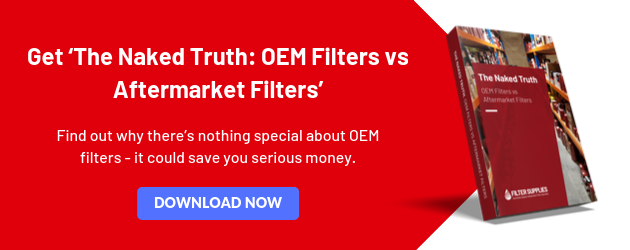Before you partner up with any old filtration supplier, here are some hot tips to make sure you’re covered when it really matters.
1. What else does your filtration supplier do?
If your filtration supplier can supply you anything that isn’t filter related, then they aren’t a specialist. If you can put a mop, toilet paper, marker pens or a windscreen on your filter order then whoever you’re buying from knows as much about filters as they do about mops and toilet paper.
Gone are the days of large industrial suppliers having the wealth and depth of knowledge they used to have 50 years ago (even 30 years ago for that matter). Unfortunately, filters and filtration equipment have been dumped into the “consumables” basket for many years now, and sadly that ends in poor outcomes for end users.
Sure, for convenience, purchasing teams like the ability to send one order to one supplier to service an entire site. These sort of arrangements are never going to return any sort of quality of supply, or knowledge, but they can work passably well when everything is smooth sailing. However, it’s when things aren’t going so well that you’ll really notice the difference. For example, you have a machine down in the field, or your ball mill is chewing through filters in a couple of hours and you need some expert knowledge to specify alternate filters, you definitely won’t be looking for someone that can do you a 200 pack of Sorbent at a special price.
Our Tip: Choose a specialist supplier that only supplies filters.
2. Is your filtration supplier local?
We’re not solely speaking about making sure you’re dealing with a supplier in Perth, Western Australia. …Although that should be fairly high on your list if you’re in WA. We’re talking about being in the same state with access to your preferred freight provider.
Some companies have tried having filtration suppliers on site, but that invariably ends badly for both parties (with some notable failures of “on-site” consumable supply in the last 25 years in WA). Realistically too – someone has to pay to provide that sort of 24/7 access, and it’s always the consumer. You have a purchasing department for that job, not for someone to tell you what you need to buy.
Plenty of companies believe they can service your local demand from the other side of the country via their call centre. You know the ones… Press ‘4’ for sales. Then, press ‘8’ for sales. Then, wait 15 minutes. Then, get cut off. This is obviously frustrating and time consuming. So, no doubt your preference will be to deal with a supplier that has a human answering the phone and will put you straight through to the person you actually need to deal with.
Our Tip: Find a local filtration supplier that you can actually speak with.
3. What type of business do they specialise in?
Ask your filtration supplier what they specialise in. It’s a pretty simple question at the end of the day – “what is your business – and who do you work best with?”
Here’s how we answer that question pretty simply. Filter Supplies WA specialises in supplying Tier 1 and 2 Mining and Industrial companies their filtration needs. Other filter suppliers might specialise in Marine or Construction. Others might specialise in supplying small mechanical workshops with their filters within a short timeframe.
This is also a great time for you to really think about how you can save time and money and streamline your process of procuring filters. Can you estimate your yearly usage? Are you open to fixed pricing? Is there anything else the supplier can do to make your life easier? These are all things that any decent supplier can assist you with as a matter of course in their normal business.
For example, Filter Supplies specialises in outline agreement and fixed-term pricing. It’s a great way to free up your purchasing staff by having your current pricing locked in. All you have to do then is send the order off complete. No waiting to get quotes back, all done in one motion.
Our Tip: Ask to speak to the sales manager of the company you’re looking at using and ask them how they’d service your business and what their ideas are for streamlining your filtration supply to increase the efficiency and lower the cost of your filtration spend.
4. How much stock do they keep?
It might seem like such a basic question, but you would be surprised how few companies keep any stock at all on their local shelves. Everything you order has to come ex-east in an airbag at your cost, or in road freight in 21 days time. Who wants to wait that long, or have to pay for an airbag?
Multiple times per day we supply stock to the large multinational suppliers, locally and on the east coast. The same ones with the call centres and no stock. On the ground in Perth is where you need the stock, not in an east coast supply base.
We can’t speak for any other specialist filter supplier in Western Australia, but Filter Supplies has over $2 million dollars worth of stock in our Perth warehouse at any one time. If we have a fixed pricing agreement with a client we keep up to 3 month’s stock on hand because we don’t want to have the client waiting when they need the filters.
Our Tip: Ask your prospective supplier if they are able to offer you fixed pricing, and if they’ll keep stock solely for your usage.
So if you want access to the right advice, knowledge and supply when it matters, use these hot tips to help you choose the right filter supplier.

